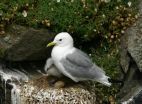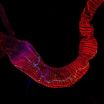(Press-News.org) One of Britain's best known seabirds winters on opposite sides of the Atlantic depending on whether its breeding attempt has been successful according to new research published today in the journal Proceedings of the Royal Society B. The findings highlight previously unsuspected links between summer breeding performance and wintering distributions of kittiwakes.
The research team was led by Dr Maria Bogdanova from the Centre for Ecology & Hydrology (CEH) in conjunction with colleagues from CEH and the British Antarctic Survey (BAS).
The discovery of such patterns of segregated winter distributions is important for defining key wintering areas in declining species such as the kittiwake that are experiencing poor breeding seasons with increasing regularity.
The results show kittiwakes that experienced breeding failure left their colony earlier than successful breeders. Failed breeders then travelled over 3000km and wintered off Canada while their successful neighbours remained close to Britain. The two groups did not differ in the timing of return to the colony the following spring. However, over half the males from both groups made a previously undescribed long-distance journey out into the central Atlantic before the breeding season.
Lead author Dr Maria Bogdanova, an animal population ecologist at the Centre for Ecology & Hydrology, said, "Our results demonstrate important but previously poorly understood links between breeding performance and winter distribution, with significant implications for populations. It is fascinating that successful and unsuccessful pairs nesting only a few metres apart in the colony can be separated by thousands of kilometres in the winter."
This study used a tiny instrument (1.4g) known as a geolocator for tracking animal migration. During the 2007 breeding season, the team fitted 80 kittiwakes on the Isle of May NNR off the east coast of Scotland, with geolocators.
Geolocators were developed by BAS and have so far been used on animals such as geese, albatrosses, penguins and seals. They make regular recordings of light intensity, data which can be used to generate two geographical positions per day.
Co-author Francis Daunt, a seabird ecologist also from the Centre for Ecology & Hydrology said, "Kittiwakes have declined substantially in the last 25 years over much of their range. Conservation efforts to protect wintering grounds should consider that winter distributions may be shifting as breeding failure is becoming more common."
INFORMATION:
Kittiwakes' trans-Atlantic winter odyssey linked to breeding success
2011-01-06
ELSE PRESS RELEASES FROM THIS DATE:
Europe reins in the smoking habit
2011-01-06
A study led by the Smoking Control Unit of the Catalan Institute of Oncology (ICO) has confirmed that the anti-tobacco laws in Europe have a direct effect on the reduction in consumption and passive exposure to smoke. This conclusion was reached by relating the Tobacco Eurobarometer and the Tobacco Control Scale (TCS).
A new study, published in the magazine Plos One, has confirmed the hypothesis that the greater the restrictions, the lower the consumption and passive exposure to smoke. The study was carried out in the 27 countries of the EU and relates the Eurobarometer ...
Neuronal migration errors: Right cells, wrong place
2011-01-06
Philadelphia, PA, 4 January 2011 - Normally, cortical nerve cells or neurons reside in the brain's gray matter with only a few scattered neurons in the white matter, but some people with schizophrenia have a higher number of neurons in the white matter. Neuronal migration errors may arise in schizophrenia as a consequence of both genetic and environmental factors.
The phenomenon of aberrant cellular localization has now been studied in detail in a paper by Yang and colleagues, published in the current issue of Biological Psychiatry.
Using a specialized technique that ...
CEOs rewarded for wrong kind of growth, Rotman paper finds
2011-01-06
Toronto – Growth is good, right?
Not always.
But compensation committees still tend to reward CEOs when their companies grow due to investments – even though that has been found to hurt long-term shareholder value – rather than only rewarding growth due to improved profitability, says a paper co-authored by a professor at the University of Toronto's Rotman School of Management.
The practice sends CEOs a message to grow at all costs, while hurting chances for companies to further improve shareholder value. Still, corporate boards may not realize what they're doing, ...
MSU leads first study of resiliency on the battlefield
2011-01-06
EAST LANSING, Mich. — In the first combat-zone study of its kind, a research team led by Michigan State University found that soldiers with a positive outlook in the most traumatic situations were less likely to suffer health problems such as anxiety and depression.
The study, which surveyed Army troops fighting in Iraq, could have implications for police officers, firefighters and others who regularly deal with traumatic events such as death. Training these first-responders to think in less catastrophic terms could help them better cope with distressing events and function ...
Vitamins C and E linked to metabolic syndrome in low-income Ecuadorians
2011-01-06
BOSTON – (January 4, 2011) With life expectancy increasing in Latin America, age-related disease has become a pressing public health concern. Results of an epidemiological study conducted by researchers at the Jean Mayer USDA Human Nutrition Research Center on Aging (USDA HNRCA) at Tufts University and the Corporacion Ecuatoriana de Biotecnologia showed that the metabolic syndrome, a condition that increases a person's risk of developing cardiovascular disease and type 2 diabetes, was prevalent in a low-income urban community in Ecuador and that a poor diet low in micronutrients ...
Porphyromonas gingivalis accelerates inflammatory atherosclerosis in a mouse model
2011-01-06
Atherosclerosis is the leading cause of death in the developed world. While a number of risk factors for atherosclerosis have been defined, scientists continue to study other possible risk factors for this disease. Recent epidemiological and experimental studies link infectious agents with the development of inflammatory atherosclerosis. A hallmark of chronic infection with the oral pathogen Porphyromonas gingivalis is the induction of a chronic inflammatory response. P. gingivalis induces a local inflammatory response that results in oral bone destruction, which is manifested ...
Trust your gut ... but only sometimes
2011-01-06
When faced with decisions, we often follow our intuition—our self-described "gut feelings"—without understanding why. Our ability to make hunch decisions varies considerably: Intuition can either be a useful ally or it can lead to costly and dangerous mistakes. A new study published in Psychological Science, a journal of the Association for Psychological Science, finds that the trustworthiness of our intuition is really influenced by what is happening physically in our bodies.
"We often talk about intuition coming from the body—following our gut instincts and trusting ...
Optimizing patient outcomes after therapeutic hypothermia for traumatic brain injury
2011-01-06
New Rochelle, NY, January 4, 2011—Lowering the body temperature of patients soon after they have suffered a severe brain injury may reduce neurologic complications and improve outcomes. The safety of therapeutic hypothermia for traumatic brain injury (TBI) has been demonstrated in national studies. According to a Roundtable Discussion of renowned experts in the field, when and how it is administered should depend on the clinical condition of individual patients. The Roundtable was published online ahead of print in the new peer-reviewed journal Therapeutic Hypothermia and ...
Pregnant, constipated and bloated? Fly poo may tell you why
2011-01-06
Clues about how the human gut helps regulate our appetite have come from a most unusual source – fruit fly faeces. Scientists at the University of Cambridge are using the fruit fly to help understand aspects of human metabolism, including why pregnant women suffer from bloating and constipation, and even the link between a low calorie diet and longevity.
Although scientists have known for some time that there are as many as 500 million nerve cells in our gut, the sheer complexity that this presents means that little is known about the different types of nerve cell and ...
MIT researchers study the danger of toxoplasma parasites
2011-01-06
CAMBRIDGE, Mass. -- About one-third of the human population is infected with a parasite called Toxoplasma gondii, but most of them don't know it. Though Toxoplasma causes no symptoms in most people, it can be harmful to individuals with suppressed immune systems, and to fetuses whose mothers become infected during pregnancy. Toxoplasma spores are found in dirt and easily infect farm animals such as cows, sheep, pigs and chickens. Humans can be infected by eating undercooked meat or unwashed vegetables.
Jeroen Saeij, an assistant professor of biology at MIT is investigating ...




